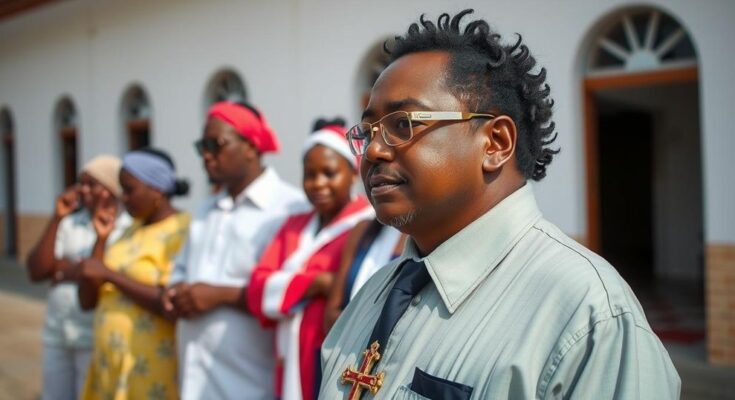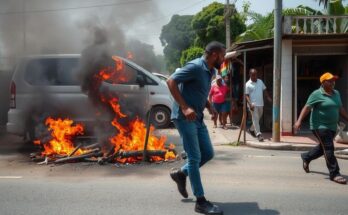Church organizations are protesting the Dominican Republic’s plan to deport 10,000 undocumented Haitian refugees per week, citing increased hostility and violations of human rights. Activists criticize the government’s stance, arguing it exacerbates the precarious situation for Haitians amidst rising violence and instability in their home country. Urgent calls for justice and dialogue are made by both local and international advocates addressing the ongoing humanitarian crisis.
Church organizations have expressed their strong opposition to the Dominican Republic’s decision to deport an estimated 10,000 undocumented Haitian refugees each week, a measure recently announced by President Luis Abinader. Activists, particularly from the Catholic community, argue that this approach exacerbates the already dire living conditions of hundreds of thousands of Haitians residing in the Dominican Republic. The humanitarian crisis in Haiti has led many to seek refuge in their neighbor, but the current policy is fostering hostility and discrimination against these migrants.
The Dominican Republic shares the island of Hispaniola with Haiti and has historically grappled with migration issues stemming from the latter, especially amid escalating unrest and violence in Haiti. As President Abinader campaigned on a platform that included a hardline stance against Haitian immigration, local activists have noted a marked increase in discrimination and violence directed at Haitian migrants since the announcement of the deportation plan.
It is important to recognize that many of these Haitian migrants possess valid claims to residency in the Dominican Republic, yet lack the necessary documentation due to systemic bureaucratic challenges and exploitation. The Scalabrinian Father Agler Cherizier emphasized, “No state in the world has a right to mistreat foreigners,” calling for a humane approach that respects the dignity of every individual. His sentiments were echoed by Scalabrinian Sister Eugenia Vásquez, who pointed out that the intense scrutiny faced by Haitian migrants has had profound implications for their well-being and safety.
In a joint letter co-signed by the Latin American and Caribbean Church Network CLAMOR on Migration, Refugees, and Human Trafficking, activists urged the government to reconsider its stance. Such coercive measures, they argue, directly contradict the teachings of compassion and hospitality that the Dominican Republic, described as a ‘Christian nation,’ is expected to uphold.
Although many Dominican officials have justified the mass deportations as necessary for maintaining national security, the apparent disregard for basic human rights raises significant ethical concerns. Community leaders like Abdias Chancy have recounted harrowing experiences highlighting the systematic violation of migrants’ rights, wherein individuals, irrespective of their legal status, face arbitrary detention and deportation.
The Dominican government’s stringent immigration policies appear not merely to target undocumented individuals but effectively limit the intake of all Haitian nationals. Chancy lamented that the government has ceased issuing visas for Haitians entirely, leading many to undertake perilous journeys into the Dominican Republic.
In light of the ongoing humanitarian crisis and the untenable circumstances faced by Haitian migrants, there is an urgent call for both national and international stakeholders to advocate for humane treatment and legal protections for these vulnerable populations. The situation demands a collective response grounded in principles of justice, fraternity, and the respect for human rights.
The Dominican Republic and Haiti share a complicated historical and geographical relationship, often marred by tensions surrounding immigration and economic disparity. Recent months have seen a surge in human trafficking and asylum-seeking as Haitians flee escalating violence and instability at home. In response to rising numbers of undocumented immigrants, the Dominican government has initiated strict deportation policies, claiming they aim to bolster national security while critics contend that these measures further undermine the rights and dignity of Haitian nationals.
In conclusion, the Dominican Republic’s deportation policy impacting Haitian migrants has garnered significant backlash from church organizations and human rights advocates. The actions taken by President Abinader’s administration not only compromise the safety and dignity of many individuals fleeing crisis but also reflect a broader systemic issue of discrimination and injustice faced by Haitians. There is a compelling need for humane solutions that uphold the fundamental rights of all individuals, urging both local and international bodies to engage in meaningful dialogue to address these critical challenges.
Original Source: cruxnow.com




